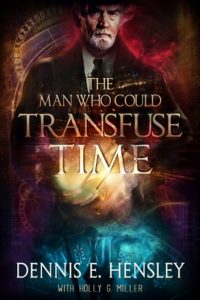Dr. Dennis E. “Doc” Hensley has published five dozen books and more than 150 short stories and 3,500 newspaper and magazine articles. His latest book is The Man Who Could Transfuse Time (By the Vine Press), a science fiction novel about a fugitive with a gift that will either bless or curse mankind forever. In this interview, Doc shares about the surprising people who inspired the story, how some theologians explain people with amazing abilities, and how he can write in so many different categories…
What inspired the story for The Man Who Could Transfuse Time?
 Back in the 1980s, I was hired by a large magazine to write an article based on interviews I did with people who were born with extraordinary powers, such as being ambidextrous or hearing with perfect pitch or having a photographic memory. They all told me that they felt they had been blessed and cursed.
Back in the 1980s, I was hired by a large magazine to write an article based on interviews I did with people who were born with extraordinary powers, such as being ambidextrous or hearing with perfect pitch or having a photographic memory. They all told me that they felt they had been blessed and cursed.
For example, the woman with the photographic memory made all A grades in high school and college because when she read her homework assignment, it was locked into her memory. Unfortunately, she could not forget times when people got angry with her and said hurtful things. Most of us forgive and move on, but she could not because she remembered everything.
These people fascinated me, so I made an entry in my journal to wonder what it would be like to have a super power that was not just rare, but unique—no one else had it. What kind of life would that person have?
Shortly after that, I wrote a book on aspects of time management called Staying Ahead of Time. Many people I interviewed told me they wished they could go back and be young again, yet still know all they know now. They said they would certainly make some major changes in their lives.
So, I wrote in my journal that I wondered if that would be a good thing or not. Would someone like that be out of synch with everyone else his or her age? Would it backfire?
Finally, I was listening to a sermon one night in which the pastor shared Paul’s words that each Christian has a distinctive spiritual gift. Hearing that made me mentally pull all these other elements together into a plot in which one man had a gift that no one else had—the ability to make the old young and the young old. He could transfuse time between two individuals. And that’s how I came up with the plot for the novel.
What did it take to create the world for this story?
Even when writing fiction, the writer has to give the readers a sense of “but this could actually happen.” So, I did a lot of research on progeria, a disorder that causes people to age seven times faster than normal.
I contacted medical experts at the Cleveland Clinic, the Mayo Clinic, and at Johns Hopkins Medical School and got all the information I could find on how the body ages and how aging can be delayed or accelerated. This became part of my novel. It gave a solid scientific element to what was being presented. And I made one of my central characters, Dr. Francis Anderson, a physician who is a geneticist.
Similarly, I interviewed theologians as to why they felt God created certain people with extraordinary abilities. Several told me that they believed Adam and Eve had superior abilities that were lost after the fall. For example, the Bible tells us that Adam gave a specific name to every one of the animals. Wow, what creativity!
It also notes that Adam could work joyously in the Garden of Eden, but it makes no mention of blisters, sore muscles, or sweat. Some theologians speculate that some of those original “super genes” may filter down and “pop up” now and then as reminders of how fearfully and wonderfully we were originally created. I made my primary character, Ian Moore, a man who is very familiar with Scripture, and he shares some of these theories as part of the novel.
What are some of the challenges for a Christian author writing about something fantastical like this? How do you keep it grounded with a biblical worldview?
To begin with, Christians are not baffled or put off by the concept of miracles taking place. Jesus performed miracles, and His disciples were able to raise the dead, give the blind back their sight, and speak in a wide range of languages. So, to offer a story in which God has graced someone with the ability to use special gifts as a way of furthering the kingdom is not something Christians will find silly or unbelievable.
However, it was my task to include enough solid theology and enough genuine science to make a convincing argument for how such a gift could possibly manifest itself in modern times.
What do you hope readers will take away after reading The Man Who Could Transfuse Time?
 Witnessing to an unbeliever about such abstract concepts as what it is to be “born again” or to be granted “everlasting life” or “to have a new life in Christ” is difficult. My novel helps people wrap their minds around the idea of how time can be altered, how time can be redefined, how time can first be limited and then be eternal.
Witnessing to an unbeliever about such abstract concepts as what it is to be “born again” or to be granted “everlasting life” or “to have a new life in Christ” is difficult. My novel helps people wrap their minds around the idea of how time can be altered, how time can be redefined, how time can first be limited and then be eternal.
I want my readers to be entertained, absolutely captivated by the strong narrative drive of the plot. But I also what them to be challenged in their thinking about how they view life and how they wish to fulfill their service to the Lord in whatever amount of time they are given.
You’ve written a lot of books that fall into different categories. How do you choose what you are going to write each time?
To date, I have written 64 published books, only ten of which were novels. Usually, when I write a nonfiction book it comes as an assignment from a major publishing house.
For example, I have written 11 textbooks on aspects of professional writing because I have a Ph.D. in English, and I am director of the professional writing major at Taylor University. So, being an authority in this area, I get approached by textbook companies when new books are needed in the areas of journalism, creative writing, or social media.
However, I’ve also been an active freelance writer for a wide variety of magazines, so I have often compiled my printed short pieces and formed them into a book, such as my collection of devotions in More Than Meets the Eye (Kregel) or my articles on motivation found in The Power of Positive Productivity (Possibility Press). Additionally, my literary agent, Chip MacGregor, comes up with job offers for me.
However, when writing a novel, I have to spend time germinating concepts and ideas, developing dynamic characters, forging pivotal scenes, and formulating scintillating dialogue. It’s a much longer process for me, but I’m always pleased with the end results.
What are the best things readers can do to support their favorite authors?
It’s obvious to point out that buying our books and posting reviews helps. Personally, I’m very gratified when my readers attend writers’ conferences where I am the keynote speaker, or they suggest to bookstore owners or librarians that my books should be on their shelves.
My biggest joy, however, is when I get a certain kind of “hate mail” that reads something like this: “Dear Doc Hensley, I started reading your new book at nine last night, and I couldn’t put the crazy thing down until four in the morning—and I still had to get up for work at seven! You’re terrible! Uh, when are you going to write another one?”
Visit Dr. Hensley’s author page here: https://www.familyfiction.com/authors/dr-dennis-e-hensley
The Man Who Could Transfuse Time
Dennis E. Hensley
By The Vine Press


